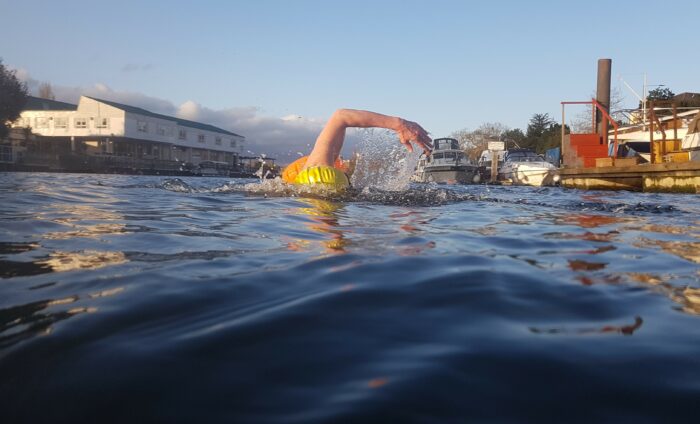
Why does swimming in cold water make you feel good
Science suggests plausible mechanisms but not the full story
One morning in March, I stood, shivering, on the banks of the Thames. A strong cool breeze blew from the south, churning up the river, which looked grey and uninviting. I measured the water at 9.5 degrees. The sky was too overcast for a redeeming sunrise. I didn’t want to do this, not right at that moment, but I knew I was going to. There’s a remorseless illogic to this. Once you’ve announced you’re going to swim, you have to do it, however much you want to change your mind at the last moment. I stripped to my swimming costume, stepped into the water, and started swimming.
The cold gets me every time. I’ve swum enough that I don’t get the full cold water shock response but it always takes my breath away. I still get an ice cream headache. Despite the discomfort, I put my face down and forced myself to swim.
Why would I do this? Why would anyone?
For me, there are two barriers to swimming in cold water. First — and especially on dark, damp, grey, windy mornings — the thought of getting in is unappealing. Second, once I’ve overcome my reluctance, entered the water and the cold has gripped me, I have to fight the urge to climb straight back out.
However, I know if I can get through the first 90 seconds (I’m enough of a swimming geek to measure this) something amazing happens. The cold, while I’m still aware of it, stops bothering me. Instead, it starts to feel good on my skin, an all-over tingling sensation. I can stretch out, relax, and swim normally.
After a swim like this one in March, I come out of the water buzzing. Swimming in cold water does that to me, and to many other people too. Science suggests a possible explanation. Researchers have measured increased concentrations of dopamine, serotonin, and b-endorphins following cold water immersion and these changes are associated with improved mood. (Source: Cold water immersion: kill or cure? M. J. Tipton, N. Collier, H. Massey, J. Corbett and M. Harper, Experimental Physiology, Aug 2017). That’s one possible explanation. Another is the well-document benefit of connecting with green and blue spaces. Maybe it’s a combination of the two? I also think it has something to do with overcoming your reluctance to do something challenging: a minor moment of achievement to start your day. Plus, you get to feel smug for doing something most people won’t even contemplate. Whatever the reason, the good mood can last for hours.
As well as the immediate mood boost, research by Outdoor Swimmer magazine shows that 73% of people who regularly swim outdoors say it is essential or very important to their general well-being (Trends in Outdoor Swimming by Outdoor Swimmer, Feb 2021). One theory for this is that cold water immersion causes a physiological stress response in the body. Adaption through repeated immersions reduces these stress responses. It’s possible that adaption to the stress of cold water immersion has a cross-over benefit that helps us cope with stress from other causes. (Source: Cold water immersion: kill or cure?)
How to get the benefits while avoiding the dangers
Getting into cold water is undeniably dangerous. Cold water shock can lead to death through drowning in minutes if the instinctive gasp response causes you to inhale water. If you survive that, then the prospect of swim failure and hypothermia awaits. How long depends on a range of factors including the conditions, your size and shape, how fit you are, and how much you have acclimatised. Your body knows this and sends all sorts of signals to your brain warning you not to get in. And if you ignore those signals and get in anyway, it sends a load more telling you to get out. Cold water swimming takes you out of your comfort zone for a reason: it can be deadly.
The trick is to manage the risks so you can experience swimming in cold water while reducing the danger. This is a matter of planning and experience (see https://outdoorswimmer.com/open-water-safety for outdoor swimming safety advice).
If you manage the risks properly, then swimming in cold water is a safe activity. It delivers a quick dose of discomfort that leaves you feeling refreshed and invigorated. Anecdotally, it does you good. And while the science is incomplete, there are plausible theories supporting the anecdotal evidence.
A key point to remember is that more isn’t better. You then have a golden spell in cold water when swimming feels amazing. Don’t be tempted to prolong this, especially if you have limited experience. Five to 10 minutes in sub-10-degree water is plenty for a mood-boost. Keep your swim short enough to avoid hypothermia so you can enjoy the buzz for the rest of the day.









